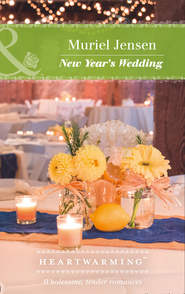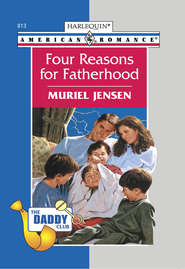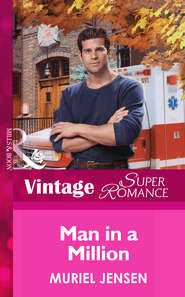По всем вопросам обращайтесь на: info@litportal.ru
(©) 2003-2024.
✖
Father Fever
Автор
Год написания книги
2018
Настройки чтения
Размер шрифта
Высота строк
Поля
“It keeps you out of the way,” David replied. “You know, like the crazy relative nobody wants to talk about.”
“Would you really rather have the guest house?” Trevyn asked Bram, still serious.
Bram shook his head at Trevyn, then grinned at David. “He’s so easy. No, I don’t want the guest house. I’m very comfortable in my apartment. I don’t need a dark room and space to store all the contraptions you’ve got. I’ve got my office downtown and when I come home, all I need is room for the television, a coffeepot and a bed.”
The three loped out of the house to the truck Bram had used to pick up the chairs from the party supplier. There were another dozen to unload. A pewter sky spit rain and blew a cold wind around them.
“Did I tell you I got a case?” Bram asked as he leaped into the truck to hand chairs down. “It’s just a divorce case surveillance, but detective work has to start somewhere.”
“At least you found an office and got it open in three days.” Trevyn took two chairs in each arm and started backing toward the house. “I’ve found a photography studio, but it’ll be weeks before I get it in good enough shape to open the doors.” He turned and hurried into the house with his burden.
David watched him go, concerned about his carefree attitude, so at odds with the burden he carried inside.
“He’s going to be all right. Stop worrying,” Bram said, handing David down a pair of chairs.
“He won’t talk about the mission,” David disputed. “That isn’t healthy.”
Bram grinned at him. “You’re a writer,” he said. “You have to understand everything. You have to know every little detail and how it relates to every other one. But some of us aren’t like that. We just let it be and go with it. He’s healing. His nightmares have stopped. He no longer gets times and places confused. Stop worrying.”
David walked back to the house with the chairs, thinking Bram was right. The three of them had been living in David’s Chicago apartment since their “retirement” two months ago and he and Bram had been awakened half a dozen times by Trevyn’s nightmares of that last mission.
David and Trevyn had been paired up by the CIA years ago, the natural combination of a writer and a photographer to seek out intelligence and bring back information. They’d held regular jobs between CIA assignments, David writing a column for the Chicago Tribune, and Trevyn working as a photojournalist. The publisher, an old military man, knew about their part-time work for the government.
On their last mission, they’d been sent into Afghanistan to track Raisu, an infamous terrorist thought to be hiding somewhere in the Paghman Mountains north of Kabul.
Bram, a security expert with fifteen years in the military and five with the Company, had been assigned to keep them safe.
They’d hired a young native man as their guide, and his sister as their translator. Bram hadn’t liked their dependence on anyone outside their small unit, but the terrain and the language were difficult and they’d had no choice.
Trevyn had formed a particular attachment to Farah, the translator, and when she’d wanted to go ahead of them to provide a distraction as David and the team approached, Trevyn had refused her. But despite all they’d heard about male dominance in Middle Eastern cultures, it apparently hadn’t applied in her case. She’d gone ahead of them anyway.
The whole thing had gone to hell within a minute of their arrival. She’d been one of the first to die.
Their escape had been a grisly ordeal. When they’d finally reached Pakistan and safety, Trevyn didn’t speak for days afterward.
They’d been debriefed, then all three had resigned.
Bram had no life to go back to, and Trevyn, though now pretending to be his old self, had seemed fragile to the two of them. By mutual consent, the three decided to stay together until they could decide what to do with the rest of their lives.
The Chicago Tribune had called David wanting to know if his award-winning social observations column would begin the following week.
As he thought about it now, it was odd how clearly he’d known he could never go back to that column. With wit that had been a gift from his father, and charm that was half natural, half manufactured, he’d written columns three times a week on life in Chicago.
He’d done it kindly, warmly, affectionately, as though life in Middle America was the most important thing in the world.
But since Afghanistan, he was less intrigued and amused by life than he was weary of what people did to each other. He had a perspective—more suited to the novel he’d been working on in his spare moments for the past year and a half. It was based on personal experience but fictionalized to protect the security and anonymity of the Company.
He found that he had a new confidence, and a new vulnerability that made him at the same time brave and uncertain—a good perspective from which to create a fictional hero.
In the house, Trevyn took the chairs from him and pointed to the large country kitchen that opened off the dining room. “Should we put chairs in there?” he asked. “Just to make sure we have enough seating?”
“Sure.” David pointed to the far end of the kitchen, where a sofa and a lamp made a small reading area. “Put them there, so they won’t be in the caterer’s way.”
Trevyn did so, and when Bram returned with the last of the chairs, he set them up opposite the sofa.
“So, you were telling us,” Bram said with a grimace, “there will be no single women at this do?”
David shrugged. “Maybe. The whole town is invited, so if there are beautiful, unattached women around who have nothing better to do on a rainy Saturday night than attend a party thrown by the historical society, your dream woman might just appear.”
“What’s she like?” Trevyn asked. “Black belt? Rapid-fire pistol champion?”
Bram grinned. “While strength is sexy, I want a woman who makes love not war. I’ve had it with conflict.”
“Amen,” Trevyn agreed. “I want one who finds me irresistible.”
“And on what planet would that be?” David asked.
Trevyn gave him a mirthless smile. “I’d take exception to that, but you’re my landlord. What else do we need to do?”
David shook his head. “Nothing. Go relax for a while. Does the costume fit?”
“Pretty well. The sleeves are a little short, but the ruffles cover it.” He frowned good-naturedly. “I can’t believe I’m doing this for you.”
“You’re doing it for yourself. Remember the historical society people are a good connection for you. Think of all those grandchildren they’ll want you to photograph. Your costume fit, Bram?”
“Yeah,” Bram replied. “Thanks to the fact there are no orangutans in my family, my sleeves fit fine.”
“Funny.” Trevyn headed for the door. “When are the caterers arriving?”
“About an hour before,” David replied. “Six or so.”
Bram followed Trevyn out the door. “Hoping to find your dream girl and a great cook all rolled up into one?” he asked.
Trevyn’s answer was bitten off by the closing door.
David went upstairs to shower, but he hesitated by the master bedroom window to look out on the ocean that stretched to the horizon.
He used to have a dream girl, he thought, as he watched the quiet sheet of gray silk, nothing moving on its surface but one lone seagull bobbing with the waves.
A woman he’d thought filled those requirements had been part of his life until last summer when she’d left him. She’d been a dramatic brunette, intelligent and sophisticated, and as work driven about her post as women’s news editor as he was with his column.
They’d had an ugly fight when his young brothers had come to visit and she’d considered it an imposition on her social schedule. He’d realized then how little he’d meant to her, except as an escort people noticed.
Now he had a completely different vision of the woman he wanted to share his life. Someone warm and soft who could laugh and smile and to whom sophistication didn’t mean being scornful of everyone who didn’t have it.
But would that kind of woman want him?
He’d changed a lot over the past few years. He had dark places in his soul. He had memories that were hard to live with. He had hatreds.











